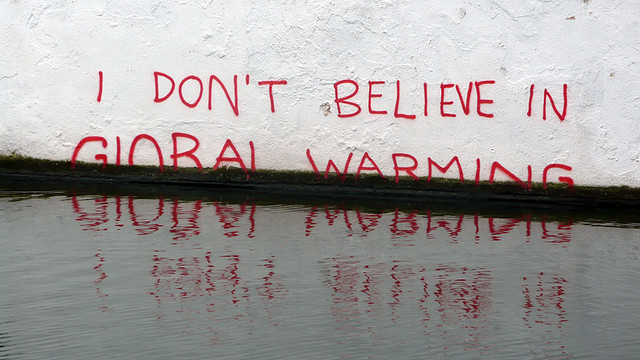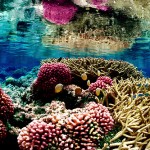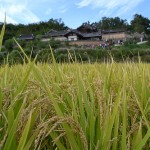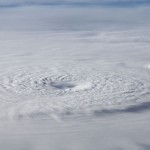Search Results for Tag: global warming
2012 in review from a climate change perspective
At the end of the year you get flooded with reviews of 2012. We won’t bore you with another one. Well, we can’t do without revisiting last year at all. So here are some interesting bits and pieces of info on what happened in 2012 from a climate change perspective.
Oil and coal are set to be phased out sooner or later, scientists are busy exploring alternatives. One of them comes straight from the gut. No kidding. In January they presented genetically engineered gut bacteria that could convert seaweed into ethanol. If the process is feasible on large scales, this may help solve the fuel-versus-food- dilemma.
Flood protection for coastal areas, habitat to thousands of species: coral reefs maintain several critical roles in the Earth’s ecosystems – some of which are under particular threat due to climate change. But at the same time corals themselves are threatened by global warming, as NASA scientists confirmed in February following one of the most comprehensive studies yet undertaken on the issue. Rising water temperatures and increasing acidification lead corals to dissolve and die – and the loss of their protective role.
But there is also good news: There is a shift in the climate change debate – from “does climate change exists?” we’ve moved on to “what impacts does climate change have?” and in the best case “how can we prevent it?”. March saw the public discuss a question – well in line with this new level of awareness: Has climate change been underestimated so far? Scientists warned, the global mean temperature could rise by 3 degrees Celsius by 2050.
Climate change is not an isolated problem, but associated with other issues – like food security for example. So, in April, experts and locals discussed at the Climate Smart Agriculture in Asia workshop how to secure rice production in a warming world with more intense droughts and rainfalls. Rice is the staple diet for more than half of the world’s population. At present some 870 million people are already suffering from hunger – not to imagine how this situation will worsen if rice production falls short.
In May world leaders met in Bonn for climate conference – but were not able to agree on any effective measures.
At least a little more optimism could be found at the Rio+20 conference in June: Our reporters Kerstin and Philipp were there for you, presenting innovative people, their ideas and opinions. Re-experience their trip here.
To mitigate global warming, researchers also come up with controversial ideas – most of them attempts to fix the climate by resorting to geoengineering. One idea was highly disputed in July: by dumping iron into the ocean, the ocean’s ability to act as a carbon sink should be increased.
Even some climate skeptics were finally convinced of the reality of climate change, when severe droughts and heat waves hit the United States in the summer months around August. Russia also suffered from extreme droughts, but for the US 2012 has been the hottest year ever recorded.
From dry and hot regions to cold ones: in the middle of September the Arctic ice cover reached an all-time low. Ice melting during the summer is not unusual, but the rate of melting and the large area affected astonished researchers.
Watching the densely populated US East coast brace for the impact of super hurricane Sandy in October, many people around the world paused – the effect of climate change appeared so undeniable as hardly ever before: More and more people in the United States – the developed country with the highest CO2 emissions per capita – start believing that climate change is real.
Following the strong winds, in November researchers declared that sealevels are rising quicker than expected: in fact, the oceans are rising 60 percent faster than previously thought.
In December super-thyphoon Bopha hit the Phillipines, being far stronger than the storm that killed more than 1,200 people in the same region a year earlier. Furthermore the next IPCC report – to be published in 2013 or 2014 – was leaked, revealing that CO2 emissions caused by humans are now “virtually certain” to be the reason for global warming. As this is not really new to a lot of people, country leaders discussed at the climate conference in Doha, Qatar how to deal with climate change. Our reporters Kerstin and Klaus went to Doha for you – revealing all the green ideas they encountered there.
What would you say – anything else we should include to complete our 2012’s climate-change-review?
Sealevel rises quicker than expected

Many coastal cities, as for example Tokyo, will have to find a way to cope with rising sealevels (CC BY 2.0: oisa/flickr.com)
At the Doha climate change conference, delegates of the COP18 again try to find a practical way how to (further) reduce greenhouse gas emissions. The importance of this goal was again highlighted by a new study released recently by the Potsdam Institute of Climate Impact Research (PIK): Researchers found out that sealevel rose much quicker than projected by the latest IPCC report.
That’s what they saw when comparing the model calculation with real satellite data from 1990 to 2011. According to those satellite measurements, oceans are rising 60 percent faster than previously thought. In absolute numbers: the IPCC report from 2007 projected additional 2 mm sealevel per year, satellite data revealt a rate of 3.2 mm per year.
Which might seem less in numbers, can make a huge difference in reality. Already for the projected 2 mm, researchers warned this might lead to flood waters, more extreme storms, and salted ground water. Yet, nobody can forecast what exactly is to happen with a higher rate of sealevel rise. But nonetheless, threat for coastlines and megacities continues to increase. Especially if no reliable mechanism will be found to reduce CO2 emissions – as in consequence sealevels will rise by several meters at the end of this century.
What a +4° Celsius world would look like
 The next climate conference is to start in Doha, Quatar this Monday – but already before it is started, participating parties are not really optimistic about a practical outcome.
The next climate conference is to start in Doha, Quatar this Monday – but already before it is started, participating parties are not really optimistic about a practical outcome.
This is especially striking when set into relation with the urgence of the world’s situation: First opinions come up claiming [german languange link] that it is not realistic anymore to limit global warming to plus two degree Celsius when compared to predindustrial level.
In this context, the World Bank released a new report last week. Written by the Potsdam Institute of climate change, they again outline what is to happen with the worlds (eco)systems in a +2 degree-world – and forecast what is to happen in a +4-degree world.
Put in simple matters: Consequences of additional four degrees won’t just be an extension of what is felt at two degrees. Naively one could guess that as temperature doubles from two to four degrees, effects “double” as well. But that is not the case. They amplify even more intense.
To give you an impression of what to expect in a +4 degree world, we have summarized the most important facts.
![]() read more
read more
Barack Obama on Climate Change

Barack Obama (Photo: CC BY 2.0: Pete Souza/Ethan Bloch/flickr.com: http://bit.ly/WFXYGs)
You might know the situation when politicians are talking and you are just wondering, whether the “facts” they name are actually true and how they fit into a larger context? That’s how we felt, when we read the statements of US presidential candidates during the pre-election period concerning climate change. It’s custom that candiates are asked 14 questions from American scientific community and one of those questions always addresses climate change (which wasn’t really subject to election campaigns). This year the question for re-elected President Barack Obama and his rival Mitt Romney was the following:
The Earth’s climate is changing and there is concern about the potentially adverse effects of these changes on life on the planet. What is your position on cap-and-trade, carbon taxes, and other policies proposed to address global climate change—and what steps can we take to improve our ability to tackle challenges like climate change that cross national boundaries?
As the US are economically and environmentally quite powerful country, it really matters what the future president’s standing is. So we grabbed three statements of each candidate and had a look what’s behind it.
![]() read more
read more
More intense hurricanes due to global warming
Many people in the world are following the way of hurricane Sandy at the moment, which hit U.S. Eastern coast last night and caused floodings and black outs in the New York area.
The densely populated and technologized regions at the Atlantic coast of the U.S. are at higher risk for more and more intense hurricanes in future time – also due to climate change, scientists say. There are mainly two criteria that account for this link: the increased ocean surface temperatures and regional cycles that amplify the effect.
Nontheless it is not that easy to link one particular weather event (as hurricane Sandy is) directly to climate change. Scientific evidence rather provides a model for the overall situation: the projections show that the criteria named above theoretically lead to more events like Sandy. But so far scientist cannot precisely forecast single weather events to come due to climate change.












Feedback